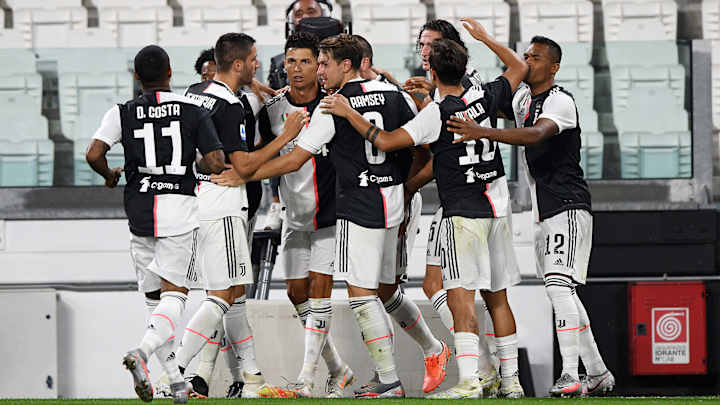Juventus's Serie A Title Another Superclub Strike in Increasingly Unsustainable Landscape

The same song plays once again in Italy. With Sunday's 2-0 win over Sampdoria, Juventus finally claimed its ninth straight Serie A title, and its 36th in total–or as many as AC Milan and Inter Milan have put together. Before the coronavirus pandemic suspended play, it looked like Serie A would have a proper race this season, but Lazio and Inter have slipped up since the restart, meaning Juventus’s run of six wins in 10 games has been enough.
Juventus apologists will talk about the goals of Cristiano Ronaldo, the skill of Paulo Dybala and the unexpected improvement in Adrien Rabiot. Manager Maurizio Sarri will celebrate the first league title of his career. Juventus has won games when it mattered and, in the sense that it has the most points and has been the best team, it is a worthy champion. But it’s impossible not to contemplate another triumph with a sense of weariness. Was this anything new? Was there any great fluency? Was this anything other than the richest team having assembled a squad of better players than everybody else?
It was the same story, of course, in Germany, France and, to a lesser extent, Spain. This is modern football. Bayern Munich, Paris Saint-Germain, Real Madrid and Juventus have all had their problems this season. They’ve all gone through periods of doubt and rough patches. It is true to point out that–other than in France–there was nothing entirely inevitable about their successes. But this is what makes their continued domination so dispiriting. Even in seasons where they’ve had problems, the elite still win.
At least Bayern can point to the transition effected by Hansi Flick. Real Madrid can see that Zinedine Zidane has imposed a defensive solidity, albeit by using the old guard. PSG has a first Champions League quarterfinal in four years to look forward to. Juve has an imbalanced squad and a manager whose methods are, at best, an awkward fit for his squad.
It’s not Juventus’s fault that Lazio has imploded on the run-in or that Inter is so inconsistent. It’s not (directly) its fault that it’s so much richer than its rivals. But this does feel like a title won almost by default. If you have Ronaldo, even a Ronaldo whose mobility is as limited as it is these days, he will score goals. But the paradox of Ronaldo grows stronger by the year.
For all his brilliance, there was always with Ronaldo a cost. He doesn’t track. He doesn’t press. He is often guided more by his ego than what is good for the side. At Madrid, that could be accommodated. His capacity to score goals made him worth the price. Perhaps he will also do so at Juve, although that would probably require winning the Champions League. Regardless, the mismatch between Ronaldo and Sarri is clear.
Max Allegri was removed after five straight titles, four of them domestic doubles. Accustomed to success in Italy, everything Juventus does these days is targeted at winning the Champions League again. Sarri was supposed to bring a more modern approach that would achieve that. But the sort of high-intensity, fluid football produced by his Napoli simply isn’t possible with Ronaldo. These are two visions of the game that do not mesh.
The modern football in Serie A has been played in patches by Lazio and consistently by Atalanta. Gian Piero Gasperini’s side, implausibly, finds itself not only third in the league (it finished third last season, too, but 21 points off Juventus's pace) but in the quarterfinals of the Champions League. This has already been the best season in its history and could yet end in something extraordinary. In a football landscape that has little room for real romance, its story is an actual fairytale, the football it plays a celebration of a vision and what can be achieved on a moderate budget.
But philosophies and coherent styles can only take a club so far. Atalanta, with its slender squad, is more susceptible to one or two key injuries and to fatigue than a club like Juventus. At some point, having lots of good players matters. There doesn’t have to be great coherence if you have Ronaldo and Dybala and Matthijs De Ligt and Douglas Costa and Juan Cuadrado and on down then line. But football really shouldn’t just be about a collection of great players. There should be some vision that inspires it, that can elevate the collective into something greater than the sum of its parts.
As the crushing march of the superclubs joylessly continues, the present model of football across Europe seems increasingly unsustainable.

An accomplished author of multiple books, Jonathan Wilson is one of the world’s preeminent minds on soccer tactics and history.